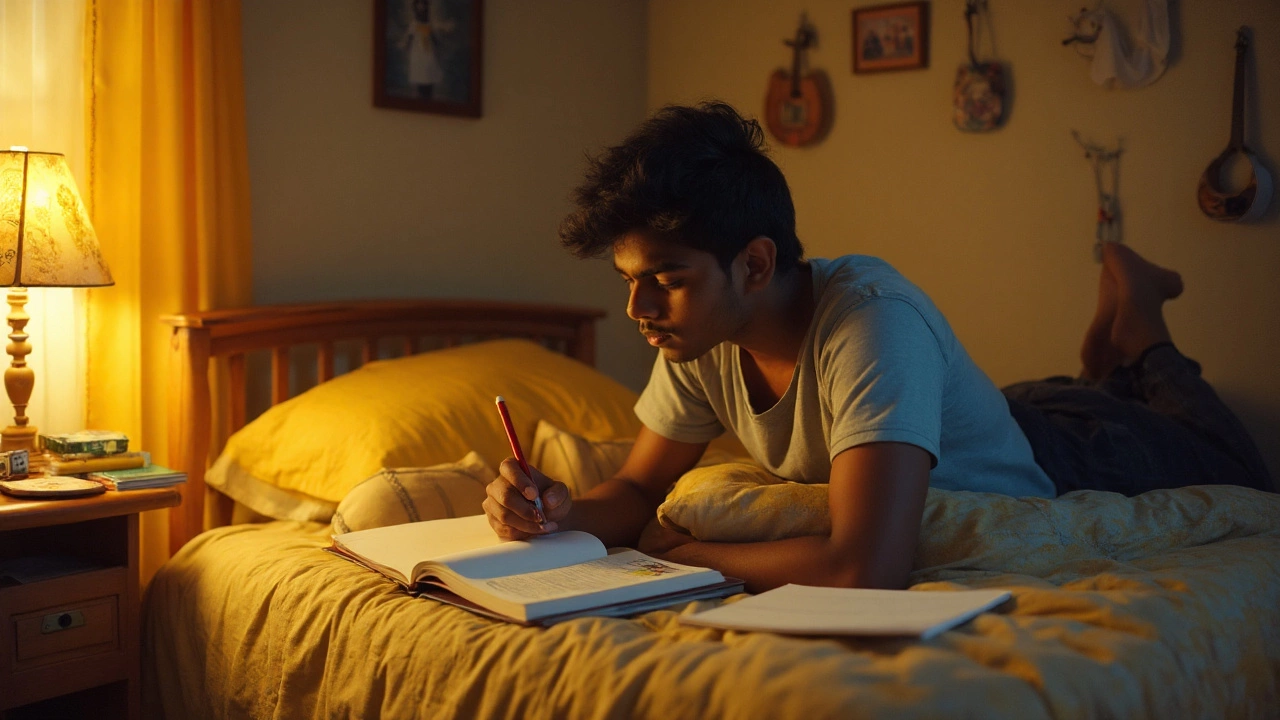How Much Sleep JEE Aspirants Really Need for Top Exam Performance

Three in the morning. Most of the city sleeps, but somewhere, a JEE aspirant desperately flips through old test papers under the glow of a study lamp. Eyes red, mind foggy—but motivation burning. Sound familiar? Stories about sleepless toppers fill the air, making it seem like anyone hoping for the IIT dream must trade pillows for textbooks. But is this just hype? Can less sleep really mean more marks? Or is there a smarter, healthier way to crack the code?
The Reality Behind JEE Aspirant Sleep Schedules
Everyone’s heard the tales. Some say "I survived on only four hours of sleep during my JEE prep and made it to IIT Bombay!" Others claim regular 8-hour snoozes and success. So, what’s the truth about how much sleep JEE hopefuls actually get?
Based on recent surveys from 2024 conducted by Allen Career Institute and Resonance, most serious JEE aspirants report sleeping between 5.5 and 7 hours a night. About 23% say they get less than 6 hours, but only around 15% consistently get 8 or more hours. Surprisingly, toppers interviewed during the 2023 JEE Advanced season mostly credited 6.5–7.5 hours as their nightly average.
Why is there such a wide range? It boils down to personal habits, coaching schedules, school, travel time, and pressure. Some students get up at 5:30 am for morning coaching, while others push late night study sessions because that’s when they feel most alert. For instance, Rajat Agarwal (AIR 143, 2022), admitted he never compromised on 7–8 hours of sleep, while quickly pointing out his batchmate who rarely got over 5 hours still only performed average.
Contrary to the hype, pulling constant all-nighters doesn’t correlate with higher scores. Chronic sleep deprivation has been tied to poor focus, lower retention, and even exam-time blackouts. Ask any coaching counselor, and you’ll hear about burnt out students—hardly able to recall concepts despite marathon study binges.
Here's a snapshot from a recent 2024 poll among 1,870 JEE aspirants at three top Kota institutes:
| Hours of Sleep | Percentage of Students |
|---|---|
| 4-5 hours | 18% |
| 5-6 hours | 35% |
| 6-7 hours | 31% |
| 7-8 hours | 13% |
| >8 hours | 3% |
Notice how the middle band—between 5 and 7 hours—captures most students. This isn’t a fluke. Both science and JEE toppers favor a sweet spot: enough sleep to recharge, without sacrificing too many precious hours.
Science Speaks: Why Sleep Matters in JEE Preparation
The myth that less sleep gives you more hours for revision is stubborn—but dangerous. Let’s break down what sleep actually does for the brain, especially for a JEE aspirant loaded with formulas, reaction mechanisms, and calculus tricks.
The brain isn’t a machine. When you sleep, especially in the "deep sleep" phase, your mind is busy sorting and consolidating everything you learned during the day. This process, called memory consolidation, makes ideas stick. Miss out on sleep, and whatever you crammed last night slips away faster than you realize. A proper sleep cycle helps your brain sift important, useful points from noise—a huge advantage when accuracy counts, as in a negative-marking JEE question paper.
In fact, a 2022 study published in the Indian Journal of Psychiatry proved that students averaging six to seven hours of quality sleep performed about 14% better in mock exams, compared to those getting five hours or less. Their recall, calculation speed, and problem-solving capability all improved.
Here’s what happens with poor sleep:
- Lowered concentration after just one “short” night.
- Memory lapses, silly mistakes increase.
- Stress hormones spike, making it harder to handle exam pressure.
- Immunity drops, inviting coughs or seasonal fevers—just ask anyone who's lost a week to the flu mid-prep.
There’s a mental health angle too. Lack of sleep can worsen anxiety, drop motivation, and make regular study sessions feel overwhelming. That nagging feeling of "I can’t do this"? Often, it’s just your overstressed, sleep-starved mind calling out for a break.
So, should you always shoot strictly for eight hours? Not necessarily. The magic number lies around 6.5 to 7.5 hours for most 16–19 year-olds. What matters more: regular sleep-wake cycles and quality of rest. It’s about how rested you feel—do you drag yourself out of bed, or do you wake up clear-headed? JEE prep itself is a marathon. Giving your body and mind time to recover is often overlooked, but it’s the hidden edge so many ignore.

Setting Up a Sleep Routine That Works
Okay, you get that sleep is important. But adjusting your routine during intense JEE prep isn’t easy. Parents expect results, teachers assign homework, coaching sessions stretch late, and group study pings never stop. So, how do you actually fix your sleep and still chase those top ranks?
Building an effective schedule starts with one idea: keep your sleep and wake-up time consistent, even on weekends. The body clock (circadian rhythm) doesn’t like surprises. If you pull a Saturday all-nighter and crash until noon Sunday, you’re asking for grogginess right when you should be reviewing key concepts. Several JEE toppers, like Aditi Sinha (JEE Adv. AIR 244, 2021), say the hardest change is learning to value rest as much as solving another worksheet.
Here are some actionable hacks:
- Aim for a fixed bedtime and wake-up time—say, 11:00 pm to 6:20 am. Stick to it during exams.
- Avoid late-night blue light from phones; it messes with melatonin, the hormone that helps you doze off.
- Use short 20-minute power naps after lunch. Don’t overdo it, or you’ll ruin night sleep.
- No tea or coffee right before bed—it won’t help late-night revisions.
- Wind down: read something light or listen to soft music (not JEE lectures!) before bed.
- If you can’t sleep, get up and stretch or walk quietly for a minute. Don’t force it.
- Keep your study space and sleeping space separate. Even a small line of difference in your room can help your mind switch modes.
Plenty of students fear that "too much" sleep means wasted time. But burning out before the final exam isn’t exactly a winning formula. In fact, right before the main exam, experts suggest slowly winding down revision intensity so your brain is fresh for the big day—think of it as a ‘taper’ before a race. A well-rested brain blitzes through problems much faster.
Some JEE-focused coaching programs now run ‘Sleep-a-thons’—friendly competitions where students track their rest. Winners are usually less anxious and score sharper in last mock tests. It’s catching on for good reason!
More Than Just Marks: Real-Life Stories and Smarter Strategies
You don’t have to pick between sleep and success. Listen to real JEE candidates and you’ll spot a pattern: those who balance hard work and rest look more energetic, more confident, and way less stressed when results roll in. Take Karan Sharma, now at IIT Delhi, who made it a rule to finish dinner, revise tricky concepts, then spend at least 45 minutes winding down—sometimes by sketching or playing guitar—before hitting the bed at 10:45 pm. His secret? Never treating sleep as a negotiable extra. "If my mind is tired, my calculations tank, no matter how much I studied," he laughs.
Sure, you’ll hear about outliers—the superhuman four-hour sleepers. But dig deeper and you’ll often find they nap through the day, or crash for 15 hours on weekends. Others quit or burn out, unable to keep pace with exhaustion. If you want to avoid these extremes, try this proven plan:
- Test different sleep windows during your prep—do you focus better with 5.5 or 7.5 hours? Track marks in mock tests versus how rested you feel the next day.
- Use sleep as a ‘revision tool’. Allow your mind to lock in tough concepts overnight, then check how much you recall without looking at your notes in the morning.
- Lean on your support network. Ask family members to respect your sleep time, or find a study partner who values healthy routines (even if your schedules differ).
- Remember, JEE isn’t just about physics or math—it’s about building an approach to problem solving that’ll stick with you through college and beyond. Treat your body with the same respect as your study material.
Science, personal experience, polls, and expert tips all bring us to the same place: the real winner in this JEE aspirant sleep debate is balance. Sleep too little, and your hard work loses power. Get too casual, and you waste precious daylight. Crack the balance, and you boost your memory, energy, and yes—your rank. So next time you sneak peeks at YouTube toppers bragging about 3-hour nights—remember, smarter (and better-rested) is the actual way to outsmart the exam.
Write a comment